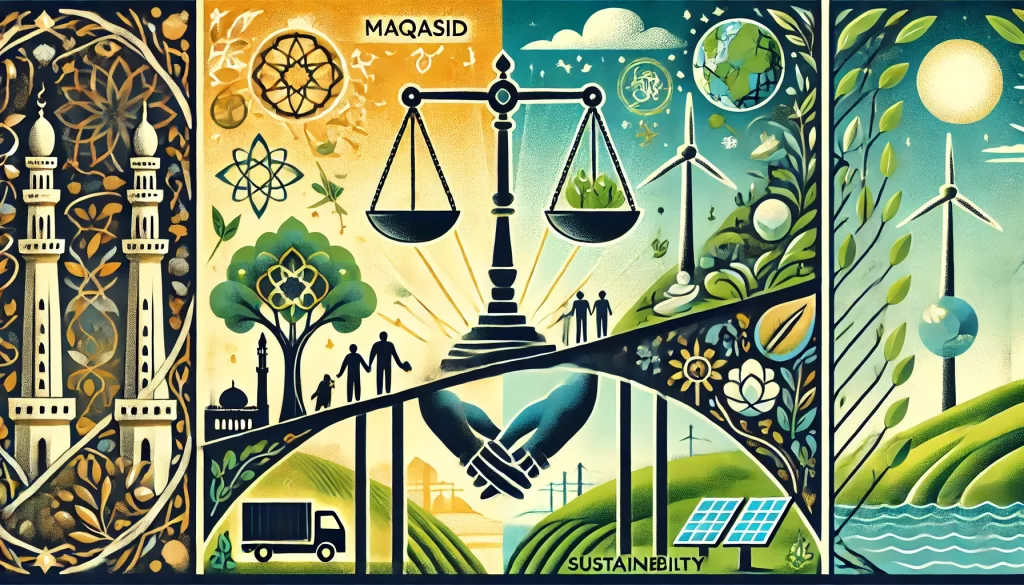In the intricate weave of global finance, there lies a powerful crossroads where the ancient wisdom of Maqasid al-Shariah and the modern call for sustainability converge. Both frameworks—one rooted in centuries of Islamic jurisprudence and the other born from pressing environmental and social concerns—share a common goal: the well-being of humanity. But are they truly aligned, or do they diverge when applied in the financial world?
Well, as you must have read, Maqasid al-Shariah, the higher objectives of Islamic law, provide a holistic framework that goes beyond individual legal rulings, emphasizing human well-being, justice, and ethical governance. Generally, these objectives aim to preserve five essential values: faith (din), life (nafs), intellect (‘aql), progeny (nasl), and wealth (mal). In recent years, the concept of sustainability has become increasingly important in global economic and environmental discussions. Sustainability, broadly speaking, refers to the responsible use of resources to meet current needs without compromising the ability of future generations to meet theirs. When viewed through the lens of Islamic finance, sustainability and maqasid al-Shariah can be seen as interrelated, though the relationship between the two is often debated. Are they convergent in purpose or fundamentally divergent?
At its core, sustainability promotes practices that foster long-term social, environmental, and economic balance. The same could be said about maqasid al-Shariah, which advocates for actions that safeguard essential human interests over the long term. Both frameworks, therefore, share a concern for enduring welfare. In fact, the preservation of wealth and resources (hifz al-mal) within the maqasid al-Shariah framework aligns closely with sustainability’s focus on prudent resource management and intergenerational equity. Islam encourages moderation (wasatiyyah) and warns against waste (israf), principles that underpin environmental sustainability. The Quran explicitly highlights the importance of maintaining balance in nature: “Do not cause corruption on the earth after it has been set in order” (7:56).
Furthermore, maqasid al-Shariah’s emphasis on the preservation of life (hifz al-nafs) extends beyond the protection of human life to the environment. The health and well-being of individuals are intricately connected to the environment in which they live. Clean water, fresh air, and fertile land are critical not only for immediate survival but also for the prosperity of future generations. Thus, environmental conservation, pollution reduction, and efforts to combat climate change align with the broader goals of maqasid al-Shariah.
However, the alignment between maqasid and sustainability is not always perfectly convergent. While maqasid al-Shariah places significant importance on ethical and moral considerations, mainstream sustainability efforts, particularly in the corporate and economic spheres, often prioritize profit maximization or cost-efficiency over ethical concerns. The global sustainability agenda, driven by initiatives such as the United Nations’ Sustainable Development Goals (SDGs), operates within a largely secular framework that may not always align with Islamic values or principles. For instance, initiatives focused on population control, reproductive rights, or certain economic policies may clash with the Islamic values embedded in the maqasid framework, particularly concerning the preservation of progeny (hifz al-nasl) or wealth distribution.
Moreover, sustainability, as defined by contemporary global standards, sometimes prioritizes environmental concerns in isolation, while maqasid al-Shariah takes a more holistic view of welfare, integrating spiritual, social, and ethical dimensions into its objectives. This divergence in scope can create tension between Islamic ethical finance and certain sustainability-driven financial instruments or policies, such as green bonds or carbon trading schemes, if they overlook the moral or social impacts on communities.
Yet, when the foundational principles of both sustainability and maqasid are closely examined, their convergence becomes more apparent. Both frameworks promote long-term welfare, justice, and ethical conduct. The challenge lies in harmonizing their implementation, ensuring that modern sustainability efforts do not overlook the deeper moral, social, and spiritual dimensions emphasized in the Islamic tradition. If these gaps can be bridged, maqasid al-Shariah and sustainability could form a powerful alliance in promoting a just and balanced world.


Great article! It was clear, informative, and very useful—just
like everything else I’ve read on this excellent site.